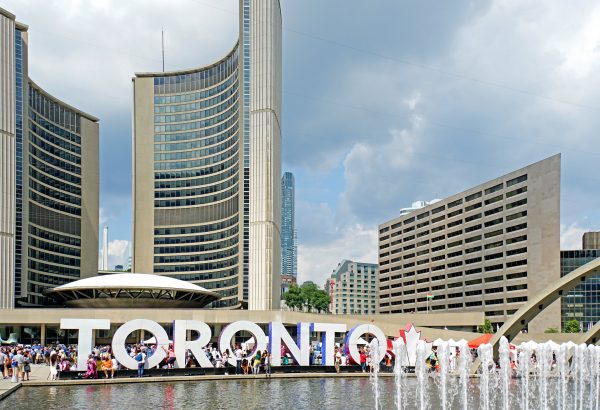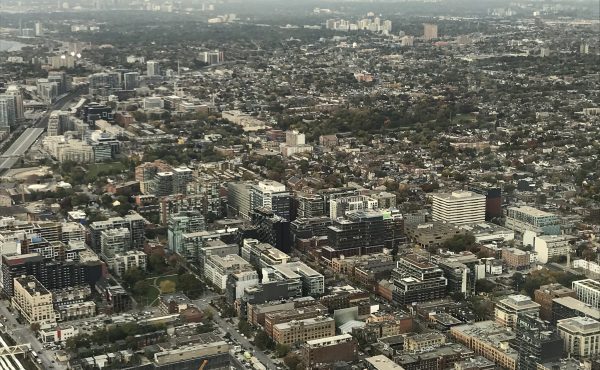This column is in response to Professor Zack Taylor’s analysis of Toronto becoming a Charter City on Spacing
In an opinion column here on Spacing two weeks ago, Zack Taylor raised a couple of good questions about our Charter City proposal including one of the most important: why would a provincial government cede power to cities? We think two reasons. First, it’s in the public interest that cities have clear control of their own affairs and predictable sources of money to pay for it. Cities know what’s best for cities; local decisions should be made by the people who have to live with them. If a province doesn’t want what’s best for the biggest engines of its economy, why should cities be a provincial responsibility in the first place?
But if a province doesn’t care about the public interest, then how about self interest? Local democracy is a pretty popular concept and last we looked, cities are where a lot of votes are. Does anyone think Doug Ford’s 71 per cent disapproval rating has nothing to do with his general disdain for local government and for cities in particular?
Prof. Taylor is right that the arrangements governing cities should be arrived at through a political process. That’s the conversation about a City Charter that we’re all currently having. But contrary to Prof. Taylor’s view, we say once sensible rules for cities are agreed upon, they must be protected by law. Strong law.
Charter City Toronto says there’s one simple “must” for Canadian cities in the 21st century: the explicit, exclusive, inherent power to act in the municipal sphere that is properly funded, written in law and guaranteed by the Canadian Constitution.
Canadians should not have their fundamental right to local government held hostage to the politics of the day. Cities should not be consigned to never-ending political games about the fundamental rules they have to follow, or about their role as a level of government. This should be especially obvious in a country whose basic rules are written in a constitution that is highly concerned with laying out clearly who in our federation does what.
Imagine a province advancing a political argument that provinces, not the federal government, should run the army. The world doesn’t work that way. That’s not this week’s political choice; it’s enshrined in the Constitution, for good reason.
Whether we’re talking a Toronto city council decimated in the middle of an election or a Calgary and Edmonton whose funding frameworks were wiped out just after one, it’s pretty clear that politics offers no guarantee for cities these days. Especially in our new winner-take-all, ‘let’s ignore the norms of politics’ system, where getting a majority of provincial seats means you can do whatever you want to cities whether they like it or not. Cities and their powers need constitutional protection.
We think some of Prof. Taylor’s other arguments against empowering and protecting cities are also wide of the mark.
City of Toronto Act
Toronto, he says, doesn’t need a City Charter because it already has one: the City of Toronto Act. In so saying, he misses entirely the very essence of a City Charter—that it belongs to the city. And is therefore protected from changes the city does not want. The City of Toronto Act doesn’t meet either test. It’s a provincial law passed by the province, and can be changed or revoked by the province at any time. The city did not pass it. The city cannot change it. The city cannot prevent it from being changed. It does not belong to the city; it belongs to another level of government entirely. It is manifestly not a City Charter.
Brain Pill
Charter City Toronto, he says, pushes “the problematic assumption that increasing Toronto’s autonomy will make its political leadership smarter or wiser or cause voters to elect smarter or wiser politicians”. As if we see a Charter as some kind of brain pill. Please.
But we do believe that if Toronto had a protected City Charter in 2018, its city council today would have 47 members, not 25. They would be younger, more female, more culturally diverse and more representative of the city. Newcomers to council would outnumber the gallery of perennial incumbents. Smarter and wiser? Maybe. Better? For sure.
City asserting its authority
Toronto, Prof Taylor says, has all the legal empowerment it needs because the City of Toronto Act grants broad discretion to act within defined spheres of jurisdiction. It’s just that the city hasn’t asserted its authority.
But how exactly should the city access that mysterious, latent power? The province has unilaterally and without consultation: cancelled the city’s land use plans, gutted its transit objectives, repealed promised funding increases, instituted massive funding cuts, revoked even the possibility of tolling our own roads and vaporized half of city council, all against the express wishes of the city and the latter with the acquiescence of the courts.
The province won’t let the city hire traffic wardens—traffic wardens!—to prevent pedestrians from being killed at record levels until its bureaucracy carefully, over months, duplicates the city’s decision-making process to make sure such a move is in the provincial interest.
Even the legal obligation on the province to consult with the city on key decisions—an obligation expressly written into the City of Toronto Act itself—is routinely ignored.
So it’s not clear exactly how the city is supposed to wield the abundant legal empowerment Prof. Taylor says it has.
More control over taxes
Prof. Taylor characterizes the financial aspects of the City Charter debate as a call for greater support for cities from the federal and provincial governments. We call it reducing cities’ dependence on the province by taking more control over some of the taxes that come from city residents in the first place.
Instead of relying on $2 billion in provincial transfers to cover one-fifth of the city’s day to day bills every year, why not earmark that as the city’s percentage of the income and sales tax paid by city residents, lock it into a City Charter and call it even? The province would still collect billions of dollars more from the city than it gives back. The city would have predictable funding and the freedom to spend it as it thinks best.
Prof. Taylor correctly points out that since capital spending for infrastructure is often a net benefit for the province and the country as a whole, it makes sense for senior levels of government to cover some of the cost. But we think cities also deserve to have a more equal seat at the table where those things are decided.
Home rule
Greater empowerment for cities (home rule), Prof. Taylor argues, is a poison pill because once achieved, senior levels of government use it as an excuse to “lose interest” in municipal issues. He also argues that in the US, state governments are endlessly scheming to find legal ways to circumvent strong City Charters in order to intervene in local affairs. Well, which is it?
At the end of the day, opposition to empowered cities is an argument for weak cities that can be pushed around, milked for their tax dollars and robbed of their right to make local decisions for themselves. If you want empowered cities but you don’t think a constitutionally protected City Charter is the way to go, what is?
Critics of a City Charter are fond of saying, be careful what you ask for, which is really a way of saying be grateful for what you haven’t got. We know what we’re asking for.
Greater empowerment makes better cities and a stronger Canada. We need the province and cities to agree on City Charters and lodge them for protection in the constitution.
Doug Earl is a member of the Steering Committee of Charter City Toronto





4 comments
Correct. City of Toronto Act is meaningless. Once again we have twin mayors running Toronto. Just as when Rob Ford was elected mayor we got twin mayors as Doug was always sticking his nose into Rob’s business.
Cutting the size of Council while the election was underway is the act of a dictator.
Tolling the DVP and Gardiner should be the City’s decision as it is a city street. They were Provincial roads until Mike Harris decreed otherwise. Unless the Province provides additional funds to maintain them the City should stop fixing them. Barricade dangerous areas, close a lane here and there etc. Let a mess develop and point to Doug the Thug.
Raise HST to 15%. It should never have been cut to 13% in the first place. 2% goes direct to the municipality where the sale took place. Let the municipality decide how to spend it.
Same goes for income tax. A portion of Provincial income tax should go direct to each municipality where person lives. Then, go after federal government for a share as well.
Let my Torontonians go!
Vancouver Charter was passed in 1953 and gives powers to the city. We are far behind.
The best argument in favour of a city’s right to self govern is nobody else can do it better.
But there another consideration: the viability of the rest of Canada if important chunks of it start splintering off.
Canada is the second-largest country in the world with one of the smallest national populations in the world. If that doesn’t render us vulnerable enough we also have neighbours to the south who covet our land and resources and neighbours to the west who covet our resources.
And if that still doesn’t make us feel a little vulnerable then there is the fact that militarily we are somewhere between very and almost entirely reliant upon the US to prevent our boundaries being breached.
What does all this have to do with the largest city which produces the greatest amount of income for the government splintering off into some sort of tax regime which excludes the rest of the country? Sadly it’s rather simple. Toronto supports the rest of Canada. It needs us and, given we are a resource-driven economy, we need it. We are Canadians not just Torontonians. Ours is a country, not a city-state.
So rather than forming Charter groups which are politically unlikely to actually happen and, pace John Sewell and his s.43 slip around, probably constitutionally impossible, we need to concentrate on making sure the territory that supports Toronto is secure.
We spent the first 100 years reliant on the British to protect us, which frankly didn’t work out well and the last half-century or more starting with that damn fool Bomarc II deal with the Dewline tucking ourselves under the wing of the US. Just how dangerous that is should have become clear about the time the Manhattan sailed through the NW passage. But in case we missed the point, Mike Pompeo repeated the effort in 2019 basically declaring it international water and depriving Canada of its apex theory of Arctic entitlement.
Now I will concede that the municipal politicians that promoted themselves to provincial paladins have very little idea how to achieve national goals, and I will also concede that the current and the previous federal governments have enjoyed at best-mixed success but I do not see that as a reason to start this navel-gazing effort of the city charter.
Time and time again our federalism has foiled our desire to achieve international goals. Taking the greatest talent pool in the country with the greatest earning capability in the country and segregating it behind a charter wall will have exactly the same effect on Canada London doing the same thing in 1643 did on England: civil war and the Dutch sailing up the Thames shortly thereafter. Then, of course, the entire city burned down and we appointed a German monarchy but in fairness that cannot be blamed on London’s protectionistic tendencies. Or can it?